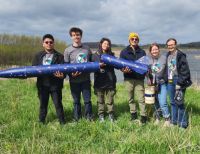The Advanced Undergraduate Research Opportunities Program, or SuperUROP, is celebrating a significant milestone: 10 years of setting careers in motion.
Originally mapped out by Dean Anantha Chandrakasan (then the head of the Department of Electrical Engineering and Computer Science, SuperUROP is designed to act as a launching pad for careers in research and industry, allowing juniors and seniors to experience an authentic — and authentically challenging — research experience. Students begin their year-long effort by identifying a project and building a relationship with a faculty member or senior research scientist, before spending many hours per week engaged in closely focused research on a specific question; writing a high-quality research paper and bringing it through the review process; and finally, presenting their findings in a scientific poster conference attended by key stakeholders, including faculty, peers, and generous supporters of the program.
Unlike most homework or exams, which usually have a highly structured result, SuperUROP research is frequently very open-ended, morphing into graduate theses, startup plans, or industry positions as students continue their work well past the semester’s close.
“Research, especially as an undergraduate, is always very challenging,” says Chelsea Finn '14, an alumna of SuperUROP who is now an assistant professor at Stanford University working on robotic interaction. “Doing research as an undergraduate student is the best way to get a flavor of the ambiguity, challenge, and thrill that comes from trying to solve problems that no one has solved before. SuperUROP is super useful for figuring out if a career in research is a good fit.”
Students come to SuperUROP to get ahead not only on research skills, but on the entrepreneurial skills they’ll need for careers in startups and industry. A SuperUROP scholar in 2015-16, Eric Dahlseng '17 went on to co-found Empo Health, a medical device company. “At its core, I think the SuperUROP program teaches undergraduates how to create things that don’t exist (whether that be processes, ideas, technologies, etc.) and share those creations with the world effectively,” says Dahlseng, whose company has introduced a device used to remotely monitor patients at risk of dangerous diabetic complications. “This is an important set of skills for research and academia, but also an immensely important set of skills for entrepreneurship.”
Dahlseng also found that SuperUROP stretched his communications abilities — “I took the communication portion of my SuperUROP very seriously,” recalls the entrepreneur, who received the Ilona Karmel Writing and Humanistic Studies Prize for Engineering Writing award for the paper portion of his project. “As I advance in my career, and especially as Empo Health grows, the importance of good scientific communication is only expanding. I find my role focusing more and more on the communication pieces as I work on growing the team and establishing strong collaboration amongst everyone, sharing our learnings with key stakeholders, and highlighting what we’re creating for end customers and users.”
Luis Voloch '13, SM '15 can also testify to the power of SuperUROP to transform strong students into strong scientific communicators. When Voloch was enrolled in SuperUROP, in 2012-13, he investigated how sources of information, including viruses, can be concealed or revealed in computer networks. He is now the co-founder of Immunai, an AI-driven cancer immunotherapy biotech company based in New York City which employs over 140 people and develops technologies at the intersection of AI, genomics, big data, and immunology. In addition to his career at Immunai, Voloch lectures within the Stanford Graduate School of Business on management and entrepreneurship topics in data science and AI-heavy companies. In both roles, the communications skills he acquired during his SuperUROP experience help him connect with students. “In my SuperUROP, I started to learn how to do better scientific communications, which I built up further during my graduate research work and beyond. Communicating clearly is a core professional and research skill, and I’m thankful we got started with it that early.”
As careers change and grow, those core skills can flex to meet new challenges. Jennifer Madiedo '19, MNG '20, a senior software engineer in Industry Solutions Engineering at Microsoft, credits her SuperUROP experience with developing her skills in scientific communication and storytelling. “How do you introduce your work to someone who may understand the overarching concepts of your field but not all the details? How do you figure out what background work is relevant and pull it into a cohesive backstory? How do you explain your methodology without losing your reader in too many details? It's all about the communication; learning to communicate deeply technical ideas in a way peers can understand was a whole new challenge I hadn't really encountered before at MIT.”
Madiedo started her career in a half-engineering, half-research natural language processing team at Microsoft, and now works directly with customers and their engineering teams to solve multifaceted problems. “I'm completely out of a lab setting now, but the skills I learned in undergraduate research truly form the bedrock of how I communicate with my teammates and peers.”
Again and again, the alumni of SuperUROP stress that communication — often regarded as a “soft” skill–was one of the most important abilities to be tested and developed by the program. “Communication is important in many areas, but is truly an essential part of science,” says Chelsea Finn, who balances her research and teaching responsibilities at Stanford with a role on the Google Brain team. “The ultimate outcome of science is knowledge, and that knowledge is not very useful if it is not communicated to others!” Finn credits much of her passion for science communication to the “infectious passion” of her SuperUROP advisor, the late Seth Teller: “Seth instilled in me the importance of conveying enthusiasm for things that I am excited about, especially when talking to students and mentees.”
With 10 years of enthusiastic alumni now engaged in groundbreaking work across many fields, that legacy of enthusiasm continues to pull new scientists into the lab, and new students into a productive year of critical thinking, communicating, and creating through SuperUROP.















